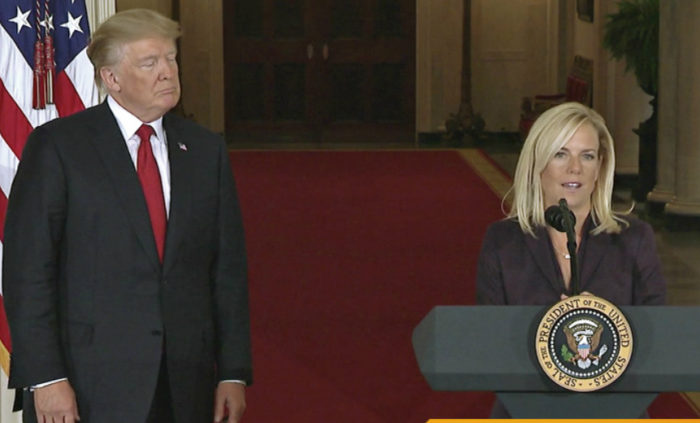

By Nick Miroff,
The U.S. Senate voted Tuesday to confirm Kirstjen M. Nielsen as the next secretary of the Department Homeland Security, installing a close confidant of White House Chief of Staff John F. Kelly to lead the federal agency responsible for carrying out many of President Trump’s most ambitious domestic policy plans.
Nielsen, 45, developed a reputation for fierce devotion to Kelly as his deputy at the White House, and before that as his chief of staff at the Department of Homeland Security, which he ran from January until July.
An attorney and cybersecurity expert, Nielsen will be the first DHS secretary with previous experience working at the agency. Her confirmation Tuesday gives the White House a DHS chief well-versed in the politics and policy goals of Trump’s immigration enforcement agenda.
“By confirming Ms. Nielsen’s nomination to lead the DHS, this Senate will take a serious step to strengthen our nation’s security,” Senate Majority Leader Mitch McConnell (R-Ky.) said in a statement.
“Ms. Nielsen will be charged with leading the department at a critical time,” he said. “With her understanding of the challenges facing our nation and her experience in prevention and preparedness, I believe that she will excel as the next Secretary of Homeland Security.”
Nielsen was confirmed 62 to 37, the narrowest margin ever to approve a DHS secretary. Though no GOP senator sided against her, the outcome reflected both intense opposition to Trump as well as doubts about Nielsen’s executive leadership experience and willingness to challenge the White House in the event of a disagreement.
Last month, a watchdog group filed an ethics complaint against Nielsen, after she used a private consultant who represents clients with millions of dollars in DHS contracts to help her navigate the confirmation process.
In January, soon after Trump took office, senators confirmed Kelly 88 to 11.
Nielsen comes to the job largely on the power of Kelly’s endorsement. She will take over from acting secretary Elaine Duke, who filled the top job in a temporary capacity for more than four months, longer than any DHS chief in the agency’s 15-year history.
Duke was confirmed as deputy DHS secretary in April, but she does not have a close relationship to Nielsen, and several administration officials say Duke has informed the White House she plans to resign once Nielsen takes over. DHS has denied that Duke plans to quit.
One of the Democrats who voted against Nielsen, Sen. Maggie Hassan (D-N.H.), said she had concerns about the new secretary’s independence. “Throughout her confirmation process, Ms. Nielsen failed to demonstrate that she would provide the steady experienced leadership — free from political interference from the White House — that the department needs.”
As the top official leading DHS, an agency with a $40 million discretionary budget and 240,000 employees, Nielsen will be responsible for a broad array of responsibilities. DHS has 22 subagencies, including immigration enforcement, transportation security, disaster preparedness and response, the Secret Service, and the Coast Guard.
“There will be no on-the-job training for Kirstjen,” Trump said when he announced her nomination in October, praising her “sterling reputation.”
Nielsen has never held the top job at a federal agency or private sector company.
Early in her career, she worked at the Transportation Security Administration and then as a White House adviser for emergency preparedness and disaster management under President George W. Bush. During her confirmation hearing, she told senators she learned key lessons about emergency management by having a front-row seat to the botched response to Hurricane Katrina.
Nielsen breezed through her confirmation hearing last month before members of the Senate Committee on Homeland Security and Government Affairs, assuring lawmakers she would not obey an unlawful order from the White House.
When asked for her views on the utility of a border wall with Mexico, she echoed comments made previously by Kelly that the United States did not need a 2,000-mile physical barrier “from sea to shining sea.”
more recommended stories
 Fentanyl Seizures at Border Continue to Spike, Making San Diego a National Epicenter for Fentanyl Trafficking
Fentanyl Seizures at Border Continue to Spike, Making San Diego a National Epicenter for Fentanyl TraffickingFentanyl Seizures at Border Continue to.
 Utah Man Sentenced for Hate Crime Attack of Three Men
Utah Man Sentenced for Hate Crime Attack of Three MenTuesday, August 8, 2023 A.
 Green Energy Company Biden Hosted At White House Files For Bankruptcy
Green Energy Company Biden Hosted At White House Files For BankruptcyAug 7 (Reuters) – Electric-vehicle parts.
 Former ABC News Reporter Who “Debunked” Pizzagate Pleads Guilty of Possessing Child pδrn
Former ABC News Reporter Who “Debunked” Pizzagate Pleads Guilty of Possessing Child pδrnFriday, July 21, 2023 A former.
 Six Harvard Medical School and an Arkansas mortuary Charged With Trafficking In Stolen Human Remains
Six Harvard Medical School and an Arkansas mortuary Charged With Trafficking In Stolen Human RemainsSCRANTON – The United States.
 Over 300 People Facing Federal Charges For Crimes Committed During Nationwide Demonstrations
Over 300 People Facing Federal Charges For Crimes Committed During Nationwide DemonstrationsThe Department of Justice announced that.
